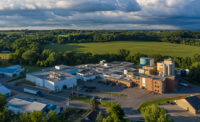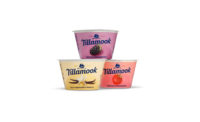Ellsworth Cooperative Creamery focuses on its community
The cooperative’s collective attitude extends to its approachable brand personality and its investments in the local community.












Ellsworth Cooperative Creamery is so known for its cheese curd production that former Gov. Anthony S. Earl named Ellsworth, Wis. — the town where the company is based — the “Cheese Curd Capital of Wisconsin” in 1984.
Though the 110-year-old Ellsworth is associated with its curd production, the company has grown into much more. Through smart plant acquisitions, Ellsworth now is able to produce barrel cheese, processed cheese and specialty cheeses (and it also sells dairy ingredients). All told, the company offers the massive number of 552 SKUs.
According to Ellsworth CEO Paul Bauer, as a cooperative, Ellsworth is constantly looking for new ways to add value for its 300 farmer-owners. And those efforts have paid off: The company is a huge player in the dairy industry, coming in at No. 78 on Dairy Foods’ Dairy 100 list of the 100 largest North American dairy companies in 2020, a jump up from its No. 87 position on the 2019 list. Its sales grew from $191.4 in 2018 to $247.1 million in 2019 — an increase of almost 30%.
Thinking cooperatively
Ellsworth didn’t actually start as a cheese curd manufacturer, or a cheese manufacturer at all. According to Bauer, the cooperative was originally in the butter and eggs business.
“There was a small cheese factory here, and a group of farmers decided to get together and purchase it. It was actually a cream separating plant in 1910, and that became the start of the Ellsworth Cooperative Creamery,” he says.
In the 1960s, the cooperative added cheese production to its capabilities. By the 1970s, Ellsworth decided to lose the other parts of its business and focus on cheese. It added a lot of cheesemaking equipment around this time so it could scale up in size.
Kari Skibbie, senior director of sales and marketing, says when the cooperative was mainly making barrel cheddar cheese, it had curds for local sale but they were not a focus.
“Everybody in the cheddar-making [business] has curds,” she notes. “And what was really cool about Ellsworth is decades ago, thinking, ‘This is something everybody loves. Let's try and get this out to the masses in the best way that we can.’”
Bauer says the cooperative used its designation as “The Cheese Curd Capital of Wisconsin” to win a grant from the USDA for value-added products.
“[We] started packaging cheese curds and were able to add a longer shelf life to them,” he adds. “When I got here, it was a pretty small volume of retail sales, and we've been able to just continue to grow that to where we are today.”
The past 10 years have been another time of massive growth, Bauer says. In 2011, the cooperative purchased a plant in Comstock, Wis., and in 2018, it bought a facility in New London, Wis., that produces process cheese.
While Ellsworth has declined in size to 300 members since its peak of 570 in 2000, it’s up 20% in milk production, Bauer notes. He believes the trend will continue as more farms consolidate.
As a cooperative, Ellsworth has different goals than a traditional dairy company. Bauer says the core tenets on which Ellsworth’s board of directors has agreed are creating and distributing wealth, being here for the next generation and communicating change. One challenge of being a cooperative is continuing to grow while also giving back equity to the farmers.
“Even though it's not guaranteed, the board has a position that we will retire equity in 10 years. So from a management standpoint, basically, one-tenth of your equity is leaving every year,” explains Bauer. “So how do you finance growth? How do you plan for that? It becomes more of a challenge as you go forward.”
According to Bauer, five years down the line, Ellsworth would like to have a transactional volume between $300 and $350 million. One way it is going to do that is by building a new plant in Menominee to produce more artisan products.
“With the addition of the Menominee plant, we'll see some growth there, and then we'll need to see about a 7% growth in our conversion to more value-added products,” he says. “So that's how we're going to get there.”
Curds and whey
Ellsworth’s massive number of product offerings are produced among its three Wisconsin plants (See the Inside the Plant story, page _ ). According to Skibbie, the cooperative makes 180 SKUs at its Ellsworth facility (primarily cheese curds), 360 different types of traditional cheese at its Comstock plant, and 12 process cheese products at its New London facility (along with additional products for private label customers).
Curds are considered the “star” product and are offered in many sizes and in multiple flavors. Ellsworth has focused on packaging snack-size offerings that are perfect for convenience stores, including 2-ounce, 5-ounce and 12-ounce sizes. It also offers a 16-ounce variety.
“We also do different flavors. We watch the flavor trends; we watch what people are using and what they want,” says Skibbie.
According to her, the most popular cheese curd variety Ellsworth produces is Natural, which is a white curd. Since Ellsworth sells its whey as an ingredient, the cheese curds don’t contain any annatto (the component that makes curds yellow). The company produces curds in many different flavors, including Cajun, Taco, Hot Buffalo and Ranch.
“We also have a new one called Hickory Bacon, which is a really good flavor,” adds Skibbie. “Who doesn't like bacon?”
Additionally, Ellsworth produces pre-breaded and pre-battered cheese curds in multiple flavors that are frozen and meant to be deep-fried later in in foodservice applications. Varieties include Buttermilk Breaded, Hot Buffalo Breaded and Beer Battered. Skibbie says the flavor is within the curds, not the breading, which means it won’t leach out during the frying process. About 60% of the curds Ellsworth produces are for foodservice, and 40% are for retail.
Outside of curds, Ellsworth makes a substantial amount of traditional cheese under three brands: Blaser’s, Antonella’s and Ellsworth Valley. Blaser’s is a brand the company purchased when it bought the Comstock plant, explains Skibbie.
“That's where we make our cheddars and our colbys and our Muensters and our brick,” she adds. “And then we have lots of flavors inside of those that we do.”
Blaser’s flavors include Muenster with Cranberry, Bacon or Hot Pepper; cheddars in Medium, Sharp, Extra Sharp or with Smoke’n Bacon; and Monterey Jack with Ghost Peppers, Hot Pepper, Buffalo, Veggies, Dill or Caraway — among many others.
Ellsworth plans on bringing the Blaser’s brand into its Ellsworth brand sometime soon. The Ellsworth brand has better name recognition, Skibbie says, so it makes sense to rebrand Blaser’s.
The Antonella brand covers the cooperative’s artisan cheese line, which includes small-batch cheese infused with specialty ingredients to create flavors such as Roasted Garlic with Tomato Basil and Pepperoni with Marinara. And Ellsworth Valley is the cooperative’s line of cheeses made from rBST-free milk. Offerings include cheddar, smoked cheddar, white cheddar, colby, Chipotle colby, Monterey Jack, Monterey Jack Jalapeño, Gouda and Garlic Gouda.
Product innovation
Ellsworth’s product development plans for the future include starting a brand of process cheese based on the capabilities it already has at its New London plant. Skibbie says the idea is to start marketing it in the coming year. Originally, Ellsworth was going to roll out the brand, called Wohlt, at the IDDBA 2020 event, but the show didn’t happen because of the pandemic.
“Wohlt used to be a customer of ours with our barrel cheeses. Their owner had passed away, and they were looking for someone to buy it,” Skibbie explains. “It's a brand new area for all of us to get into and to sell and learn about. So, we want to … get it running, really showcase it, and then we'll see where we go from there.”
Ellsworth is also in the research phase of developing its first freeze-dried cheese curd product. It’s a crunchy cheese snack that doesn’t need refrigeration, and thus is ideal for on-the-go occasions such as hiking and fishing.
According to Skibbie, the company is currently thinking through potential marketing angles such as: “Everybody loves the squeak of the fresh cheese curds. You're gonna love the crunch of the freeze-dried.”
Bauer says the cooperative is also looking into producing more artisan cheese offerings that command a premium so Ellsworth can provide more value to its farmer-owners.
“In adding the Menominee plant, we're looking to diversify our value-added [business] and try to provide more value for our members' milk,” he says. “We [currently] do an artisan Antonella product that is an American-style cheese that's hand-rolled into spices. And we can, I think, expand that a little further and provide different opportunities for that.”
Approachable personality
To market its products to potential retail customers, Skibbie says Ellsworth starts with the cooperative’s farmers and the high-quality milk that they deliver.
“We've got a great backing, great-quality product to start with,” she explains.
For the cheese curds specifically, Ellsworth’s salespeople often win over retailers by speaking about the product’s shelf life of nine months. But they often have to explain what a cheese curd is to non-Midwestern attendees at trade shows, Skibbie says.
The healthful qualities of curds is another selling point, says Becky Beissel, marketing and engagement manager.
“Our cheese curds are white, and so they're always viewed as being really wholesome, natural, healthy,” she says. “And that seems to really connect with people.”
As far as the company’s marketing strategy goes, Beissel says Ellsworth stopped doing “traditional” advertising such as television spots and sports sponsorships around seven years ago. Since then, it has focused almost all of its marketing efforts on social media, specifically Facebook.
“The success from the social media outweighed everything else they were doing, and there was more of a return on investment that could be seen,” she explains. “And so, Paul [Bauer] decided to cancel all the other things.”
The cooperative’s social media strategy involves crafting a fun, approachable brand personality and being really interactive with the fans who engage with Ellsworth’s social media. For example, Beissel says she manages the company’s Facebook page and recognizes fans’ names from what they’ve said in the past, so she is able to interact with them on that level.
“So it's not the old marketing approach where it's just one-sided ... like we're blasting you with our messaging,” Beissel says. “It's really like we're building a community of people that just love us, love our personality, love our company.”
Beissel says Ellsworth saw the benefits of its community-focused approach during the coronavirus pandemic. The company made a Facebook post about the struggles it was facing and had a remarkable response from its fans.
“The amount of people that were like, ‘What do you need? Do you need me to order cheese? Do you need me to come to the store?’ was amazing,” Beissel recalls.
Beissel explains that while Ellsworth uses other social media platforms, Facebook is by far the most successful. The cooperative also uses Twitter, YouTube, Pinterest and Instagram. For Instagram, Ellsworth normally reposts user-generated content that it comes across when someone tags the cooperative in a photo or story.
“Facebook is really the best platform for that because there's just a lot of engagement back and forth between the brand and all the fans,” she notes.
The cheese curd experience
One form of marketing that Ellsworth has retained is throwing events based around its cheese curds. For the past 20 years, the cooperative, along with Ellsworth Area Chamber of Commerce, has put on an annual Cheese Curd Festival. The event used to be a small, local affair, but after witnessing the success of food festivals, the cooperative opted to change the scale of the event. The festival went from around 1,000 attendees five years ago to 30,000 in the past couple years, Beissel says.
The festival is a big public relations opportunity for Ellsworth, but more importantly, it is a fundraiser for the local community, she explains.
“Nonprofit volunteers fill all the volunteer needs, and then they get paid for their time, and so that money goes back to the nonprofits,” she says. “The chamber makes money from doing deep-fried cheese curds and also beer and wine sales. So, that's the chamber's main fundraiser, but all the money [goes] back into the community.”
Bauer himself serves as the co-chair of the Cheese Curd Festival.
“I want Ellsworth to be a good corporate citizen,” he says. “So in order to do that, you need to put time and effort into different things.”
With the COVID-19 pandemic this year, Ellsworth was unable to hold the same kind of event. However, it wanted to ensure the local community still got the fundraising money on which it depended. So it pivoted to a mainly virtual event that also included a drive-up cheese curd window, says Beissel. The company deep-fried 1,702 pounds of cheese curds in eight hours.
Another experience Ellsworth offers is two retail stores at two different locations, each of which features a food trailer wagon. Throughout summer weekends, the company offers deep-fried cheese curds out of the trailers.
“I guess you could say that we're just all about the experience across the board, [whether that’s] the experience that they're getting on Facebook, the experience they get when they come to the retail store, or the experience they're getting when they buy our product from wherever it is across the world,” Beissel says.
Community stewards
Ellsworth invests a lot in its local community beyond its efforts with the Cheese Curd Festival. For his part, Bauer is on the Ellsworth Area Chamber of Commerce board and has also served on some regional economic boards. Additionally, he’s on the Chippewa Valley Technical College board as a trustee and will become its president this upcoming year. He was also appointed as a trustee to the board of the Wisconsin Department of Agriculture, Trade and Consumer Protection.
“I ask others in my management team to reach out into different areas that they too can be part of the community, whether it's in Wohlt or Comstock. So we try to divvy that up a little bit,” Bauer says.
One big investment Ellsworth has made is in affordable housing in its area. The rental prices in the towns in which Ellsworth operates are high, and there is a shortage of options.
“We purchased some land a few years ago, and actually got the board willing to sell the land at a substantially reduced price in order to help facilitate housing,” Bauer says.
The cooperative is still working through the details of this plan, but Bauer says the point is Ellsworth Cooperative is actively involved in improving its local community.
“Ellsworth has a unique position of being the largest employer in Ellsworth, and if not the largest, one of the largest private employers in the [overall] community,” he adds. “And when you look at what dairy plants give back to the community in a cooperative, our impact is over $2.5 billion to the local economy.”
Bauer says he and other members of Ellsworth’s board use the cooperative’s position to be an advocate for rural issues that come up in Wisconsin legislation, whether that's broadband or housing or health care issues. He’s driven the five hours to the state capital to speak on these topics.
“You can't just give lip service to the community,” he says. “You gotta put a little more effort into it.”
Looking for a reprint of this article?
From high-res PDFs to custom plaques, order your copy today!













